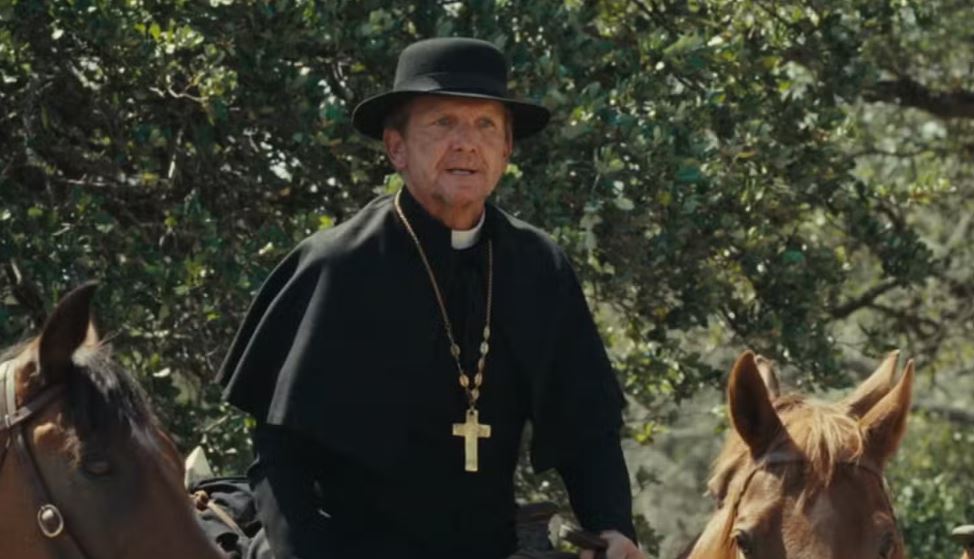Father Renaud (Sebastian Roché) went through a complete transformation in 1923 season 2, and he ended up becoming the thing he hated about Teonna Rainwater (Aminah Nieves). Since the end of 1923 season 1, when Teonna killed the nuns at the boarding school, Renaud and Teonna have been mortal enemies. He enlisted the help of Marshal Kent (Jamie McShane), tracked Teonna all the way from Montana to Texas, and even got his hands bloody in the process. It wasn’t until the ending of 1923 season 2, episode 6, however, that they actually met face-to-face for the final time.
By the time Renaud and Teonna finally met each other, however, neither of them were the same people who had left Montana. Teonna started and lost her first romance with Pete Plenty Clouds (Jeremy Gauna) and she had finally found some happiness while traveling with Runs His Horse (Michael Spears) only to watch him die. Renaud’s transformation was more overt, however, and he somehow became even worse than he was while abusing Teonna at the boarding school. By the time he became one of 1923 season 2, episode 6’s major character deaths, Father Renaud became exactly the thing he thought Teonna was.
Father Renaud Became What He Hated About Teonna Rainwater & Marshal Kent In 1923 Season 2
Renaud Hated Teonna Because She Used Violence To Punish Cruel People & He Did The Same To Kent

Father Renaud hated Teonna because she killed three of the nuns in his boarding school, but there was more to it than that. Teonna used violence to punish cruel people like Sister Mary (Jennifer Ehle) and keep them from abusing their power to hurt more people. When Renaud killed Marshal Kent for his unnecessary cruelty towards Native Americans, he did exactly the same thing as Teonna, and he committed the same “crime” he was hunting her for. He used violence to stop Kent’s cruelty, but his twisted sense of faith and ideas about Native Americans kept Renaud from seeing just how similar he was to Teonna.
Renaud became extremely similar to Teonna in 1923 season 2, partly because he saw himself reflected in Marshal Kent. Throughout their journey, Kent drew parallels between himself and Renaud. For instance, he mentioned several times the graveyard behind the boarding school, and he was right to draw those comparisons. Renaud and Kent both abused their power – as a member of the clergy and as an officer of the law, respectively – to hurt vulnerable people. Kent just took it to a harsher extreme. Renaud must have known on some level that Teonna was just as justified in killing the nuns as he was in killing Kent.
Renaud’s Twisted Sense Of Faith In 1923 Explained
Renaud Was Able To Justify All Manner Of Cruelty As Serving God
Father Renaud was able to justify all his atrocities and horrible deeds because of his wildly warped sense of faith. As a Catholic priest, Renaud was supposed to love his neighbor and do unto the least of his brothers and sisters as he would do unto Jesus Christ himself. Somehow, Renaud managed to twist that message into his cruel and cynical view that the only way to “love” Teonna and the other Crow girls at his school was to beat them into assimilation. He genuinely believed that he was helping Native Americans by forcing them to accept Christianity, and he took a very Macchiavellan approach to that task.

Renaud’s problem wasn’t so much with Catholic doctrine as it was with his very notion of good and evil and his bigoted view that Native Americans were heathens and less than white Christians. That utterly vile view of the world is the same reason Renaud was alright with murdering Marshal Kent: because the end was ridding the world of another evil murderer, the means of killing him were justified. Renaud could justify almost anything by viewing his own actions as a necessary evil to serve God’s will.
Renaud’s Journey In 1923 Season 2 Drove Him To Become A Killer
Renaud Was Always Sick, But The Arduous Journey To Texas Rotted Him To The Core
One of the most interesting things about Father Renaud in 1923 season 2 is trying to pinpoint exactly when he made the transition from a horribly cruel priest to a full-blown murderer. Somewhere during the journey from Montana to Texas, something inside of Renaud snapped spiritually, mentally, or both. He either witnessed Kent commit one too many atrocities or couldn’t handle killing a Comanche child, as he did in 1923 season 2, episode 2. Renaud’s last straw was watching Kent kill Pete Plenty Clouds in cold blood. By that point, even murder was on the table.
Renaud’s devolution into murder is likely also why he was so obsessed with getting Teonna to repent and accept salvation. Either consciously or unconsciously, Renaud likely saw the parallels between himself and Teonna. On some level, he knew that he had killed two men in cold blood, and he knew that he needed redemption to avoid perdition. Renaud needed Teonna to accept salvation because he needed to know that he could accept it himself. When she refused, it sent Renaud spiraling, and gave Teonna a chance to see the end of 1923 season 2 alive.